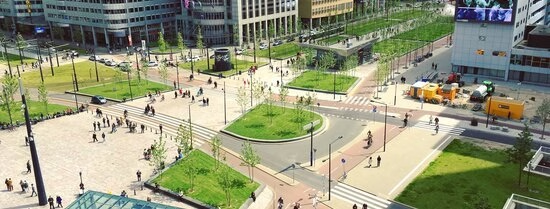Introduction
Cities are the primary source of growth and innovation but, at the same time, a large consumer of energy and raw materials. The unsustainable model of our cities, together with the advent of climate change, the shortage of fossil fuels and natural raw materials, are forcing cities to rethink their way of planning and growth. In this context, cities are responding with arrays of options or levers at their disposal when it comes to improving their overall green performance and eco-efficiency. The course provides a collection of concrete local solutions and policies that cities in many countries are applying for integrating green concepts into their planning and managing processes.
Practical information
- Start date
- On demand
- Duration
- 3 weeks
- Price
- € 4,050
- Area of interest
- Cities & Port, Public Domain & Governance, Sustainability & Transitions
- Micro Credential
- No
- Teaching mode
- Hybrid
Who is this for?
You can work for an NGO or as a government official, and you can be a consultant, an advisor, a lecturer, an academic or a researcher. If you are engaged in sustainable development or policymaking, this course is right for you.
You will be introduced to the IHS-Green City Concept Framework, and the different approaches cities around the world are promoting to become greener. Such as increasing urban green areas and energy efficiency; promoting circular economy, renewable energy, green (sustainable) transportation systems; greening urban services by promoting energy efficiency and using renewable energy to deliver drinking water, wastewater, stormwater and solid wastes services; promoting eco-industrial parks; new methods in urban agriculture (food security), green homes and green economics & green growth tools being used to help cities become green cities.
Green Cities for Eco-efficiency employs various learning methods, including lectures, group discussions, documentaries, field visits and group exercises. Many sessions will be dedicated to participants sharing their experiences from their respective countries. At the end of the course, participants will apply their newly obtained knowledge to measure how much green a city is (measuring the actual city environmental performance) and use this result to create a green city action plan for a town of their choosing.
Thematic coverage of the course is built upon the Green City Concept developed at IHS. It provides a framework of entry points and enablers that play a critical role in making cities green. Thematic areas covered in the course are: Green City Concept, IHS Spatial Form for Green Cities Green Transport, Buildings and Energy Greening Urban Services and urban agriculture Circular economy Green City Action Plan Green Economy/Green Growth
Start date
Course coordinator
Charmae Pyl Wissink-Nercua, Specialist in Nature-based Urban Development and Capacity-Building
Reach out for more information
- Email address
- courseinquiries@ihs.nl
Facts & Figures
- Start date
- On demand
- Duration
- 3 weeks
- Price
- € 4,050
- Tax
- Excluding 21% tax
- Micro Credential
- No
- Instruction language
- English
- Teaching mode
- Hybrid
